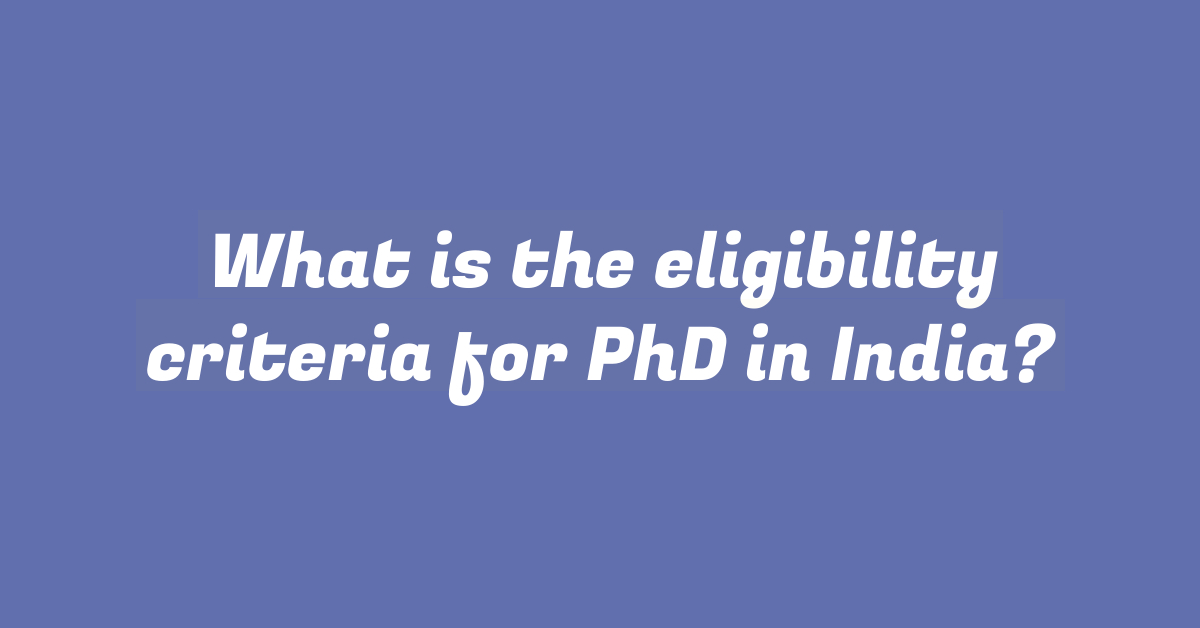PhD Educational Qualification
The educational qualifications required to be eligible for a PhD program in India are:
- Post Graduate Degree (Master or M.Phil) with minimum 55% marks or equivalent in the relevant field from a recognized University or Institute. Some universities may also accept candidates who have a bachelor’s degree with a minimum of 60% marks along with a relevant postgraduate diploma or certificate course.
- Qualified UGC NET/CSIR
- The postgraduate degree should be in a subject that is relevant to the area of research that the candidate wishes to pursue in his/her PhD programme.
- Apart from the minimum marks requirement, some universities may also have specific subject-wise requirements for eligibility. For example, a candidate may need a master’s degree in physics to be eligible for a PhD program in physics.
- Candidates who are in the final year of their postgraduate degree can also apply for a PhD programme, but their admission is usually conditional on successful completion of their degree with the required marks.
phd age limit
There is generally no upper age limit for pursuing PhD in India. However, some universities or funding agencies may have their own age restrictions for awarding scholarships or fellowships.
The University Grants Commission (UGC) sets the upper age limit for Junior Research Fellowship (JRF) at 31 years, while there is no age limit for the National Eligibility Test (NET). However, these age limits are specific to the eligibility criteria for the scholarship and not for the PhD programme.
However, some universities may give preference to relatively young candidates, as PhD programs require a significant investment of time and resources, and younger candidates may be more likely to complete their research on time. However, this preference is not usually stated as a formal age limit, and universities are more likely to consider factors such as the candidate’s academic qualifications, research experience and ability to contribute to the field of study.
UGC NET amended rules for PhD admission
PhD work experience
Work experience is generally not a mandatory requirement for pursuing a PhD in India. However, some universities may prefer candidates who have some relevant work experience, especially if it is in a research or academic field. In such cases, work experience can be considered a positive factor in the selection process and can give the candidate an advantage over others who do not have work experience.
Work experience can also be helpful in developing research skills and gaining practical knowledge in the field of study. Candidates with work experience may have a better understanding of the practical applications of their research and may be able to contribute to the field in a more meaningful way.
However, work experience alone may not be sufficient for admission to a PhD programme, and candidates must still meet other eligibility criteria, such as academic qualification, entrance exam score and research proposal, as mentioned above. Ultimately, the selection of candidates for a PhD program is based on a combination of factors, including academic qualifications, research ability, work experience (if any), and other relevant factors.
Is UGC NET mandatory for PhD in India?
We always have a big question while applying for PhD admission: “Is UGC NET mandatory for PhD in India?”. UGC NET is not strictly mandatory for pursuing PhD in India, but recent regulations emphasize its importance. As per the updated rules, 60% of PhD seats in affiliated universities are reserved for students who qualify UGC NET or Junior Research Fellowship (JRF). The remaining 40% seats are filled through entrance examinations conducted by universities or colleges.
Although UGC NET is not mandatory for all PhD admissions, clearing it offers many benefits, including better career opportunities and eligibility for promotion in the education sector.
The eligibility criteria for admission to a PhD program may vary from university to university. Furthermore, the requirements may vary depending on the field of study, availability of scholarships/fellowships and other factors of the respective universities. Candidates are advised to check the eligibility criteria of the universities they are interested in before applying.
sharing is Caring!
